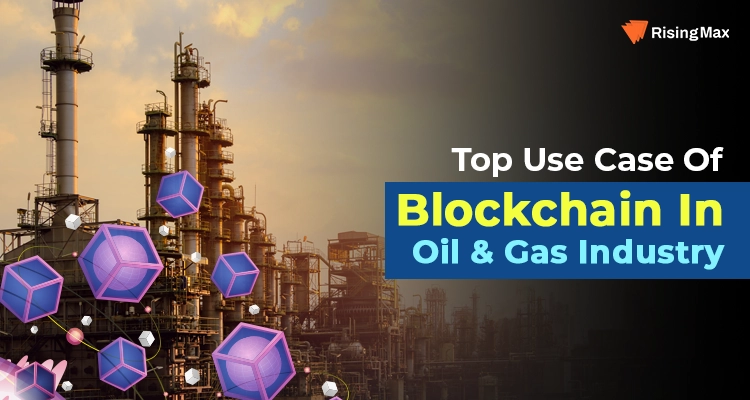The blockchain holds a huge potential to enhance the business and user experience. The demand for the blockchain is increasing amorously and creating a whole new scenario for the business and the users.
Like any other, the oil and gas industry has intermediaries, manual operations, and associated costs. Automation of such processes within the company and between contractors is the main goal of all services and departments. Blockchain technology, in turn, offers the oil and gas industry new opportunities to solve financial, trade, and logistic problems.

Using a distributed ledger can help create a single trusted space between counterparties, while smart contracts automate some of the functions. In this blog, we will discuss the top use cases of blockchain in the oil & gas industry.
RisingMax Inc. is the leading blockchain development company helping oil & gas enterprises to integrate blockchain with perfection. Get a free consultation for integrating blockchain in business.
Schedule A Call Now!
Best Use Cases Of Blockchain In Oil & Gas Industry
Let’s see some of the best use cases to know how blockchain technology is enhancing the oil & gas industry. Later on, you will also get to know how you employ blockchain technology for your business.
Tracking Carbon Footprint
Reducing costs and improving cleaner working practices are at the top of the oil companies’ list of priorities, and blockchain offers them a way to do it. Unlike existing valuation methods, blockchain technology can accurately estimate the carbon footprint of an oil field project as well as estimating its carbon footprint.
Thus, the accuracy provided by blockchain would allow for better certification processes in the future, as regulators insist on stricter standards when it comes to carbon emissions.
Moreover, understanding the current carbon footprint of a project will enable companies to be more transparent and work to improve environment-friendly practices.
Improved Management
One of the major blockchain use cases in the oil and gas industry is improved land record management. In reality, the companies must manage all of their land records as they are the product of millions of dollars of investment.
However, the traditional or paper-based way of maintaining such a large scale of records is cumbersome. Not to mention it can fall into the wrong hands, who can then exploit it.
But with blockchain, this issue is fully manageable. As you already have access to an immutable ledger, companies can upload the information along with documentation of the land registries. So, you can fully secure the documents, as no one can ever alter or delete them from the system.
Secured Data Storage
Another one of the blockchain use cases in the oil and gas industry is the data storage of IoT devices. In reality, with the evolution of technology, companies now use a lot of IoT devices to monitor their various operations.
However, the security of the data that the IoT devices collect is almost nonexistent. In general, IoT devices don’t have any decentralized structure, so they are prone to attack and vulnerable to cyber hacks.
But if the companies start to use blockchain as the primary way to store the data, they can safeguard all of the information from the wrong hands. It can actually offer a security layer with cryptography to encrypt all the data and make it confidential.
Equipment History Records
The current Internet of Things (IoT) ecosystem in oil and gas organizations relies on centralized, brokered communication models. The communication is primarily through the server-client model with a huge dependency on storage capacity. Though the devices are in close proximity, the connection between them must go through the internet.
This model has been in use for decades, connecting generic computing devices and supporting small IoT networks. But it will not be able to respond to the growing needs of the IoT ecosystems of tomorrow.
A simple solution for equipment history records management is blockchain. Traditionally, the entire record of the equipment is stored on a central server. With a blockchain solution, a distributed digital ledger is created, which stores the transactions among the various nodes of the network. In order to make any changes to the record, one must first register on the blockchain.
Only those nodes that are identified and authenticated by secure cryptographic methods will be allowed to add or make changes to the ledger. The other nodes on the network must confirm this transaction for the change to be accepted. It eliminates the need for a central authority.
Digitalize Your Ways Of Doing Business Using Blockchain Solutions By An Authoritative Blockchain Development Company
Supply Chain Management
Each oil or gas plant is huge in size and needs many human resources to coordinate between all instances or elements.
But maintaining or keeping a link between these elements is a complex and challenging task. Without proper supply chain management in place, there is no way they can deal with all the elements at once.
Therefore, using blockchain in the oil and gas sector can help to improve supply chain management. In reality, blockchain can monitor the system 24×7 without any human interference. So, any issues or problems are easily traceable through the platform.
No Error
Human error results in a large number of reconciliation operations which are time-consuming and cost money. Human mistake is not completely eliminated by blockchain technology but will reduce to 0.01%; someone may still enter an alphanumeric number wrongly into a blockchain network.
However, because of the technology’s general data openness, the records of these failures are clearer. As a result, reconciliation processes are simpler, less expensive, and less time-consuming.
The use of blockchain will bring significant benefits to companies in the oil and gas industry in the future. Blockchain technologies will enable fast, controlled, immutable, transparent, and auditable B2B transactions between network participants and their suppliers, distributors, and partners.
Top Oil & Gas Companies Implementing Blockchain
Let’s see some of the global leaders of the oil & gas industry who have integrated blockchain into their business to provide a perfect and error-free environment from top to bottom.
- Shell
- BP
- ExxonMobil
- Lukoil
- Gazprom
- Saudi Aramco
How To Integrate Blockchain Into Oil & Gas Business
If you plan to take your established oil & gas business onto the blockchain or want to develop it, here are the steps that will help you understand blockchain technology and make a decision.
Research
The very first step is to do research on the scope of the blockchain and which of the companies are providing the service of blockchain integration. Also, research the integration cost and blueprint for integrating the blockchain into business.
Hire Blockchain Development Company
The integration of the blockchain into the business is a crucial task, and it cannot be done without the help of a blockchain development company. From the blueprint to the final deployment, only a blockchain development company can help you out with that. Be very specific with the features and tech stack before hiring a development company.
After hiring the blockchain development company, they will take the following steps to integrate blockchain into business:
Develop Smart Contracts
Smart contracts are self-executing contracts that automatically execute predefined terms and conditions. They can facilitate various oil and gas industry processes, such as royalty calculations, automated payments, and compliance verification. Engage developers to write and deploy smart contracts on the chosen blockchain platform.
Integrate IoT and Data Sources
Integrate Internet of Things (IoT) devices and data sources into the blockchain network. IoT sensors can provide real-time data on equipment performance, environmental conditions, and supply chain logistics. This data can be securely recorded on the blockchain, enhancing transparency and traceability.
Consensus Rules
Establish clear governance and consensus rules for the blockchain network. Determine how decisions will be made, how new participants will be onboarded, and how the network will be upgraded over time.
Consensus mechanisms such as proof-of-work or proof-of-stake should be selected based on the desired level of decentralization and security.
Regulatory Considerations
Ensure compliance with relevant regulations and industry standards. Consider factors such as data privacy, intellectual property rights, anti-money laundering (AML), and know-your-customer (KYC) requirements. Compliance frameworks can be built into smart contracts to automate certain regulatory processes.
Test and Deploy
We will test the blockchain network to ensure its reliability, security, and performance. Identify and address any potential vulnerabilities or bottlenecks. Once the network is deemed ready, deploy it in a production environment and gradually onboard relevant stakeholders.
Train Users and Provide Support
Educate your employees and relevant stakeholders about blockchain technology and its implementation in oil and gas. Offer training sessions, user guides, and support channels to ensure a smooth transition and maximize the new system’s benefits.
Continuously Monitor and Improve
Regularly monitor the blockchain network and gather feedback from users. Identify areas for improvement and implement necessary enhancements. Stay updated with advancements in blockchain technology to leverage new features and capabilities.

Conclusion
Remember that implementing blockchain technology requires careful planning, collaboration with experts, and adherence to best practices. It is advisable to consult with blockchain specialists or engage a dedicated development team to ensure the successful integration of blockchain in the oil and gas business can provide numerous benefits, including improved transparency, enhanced security, streamlined processes, and increased efficiency. Here are some steps to help you get started:














